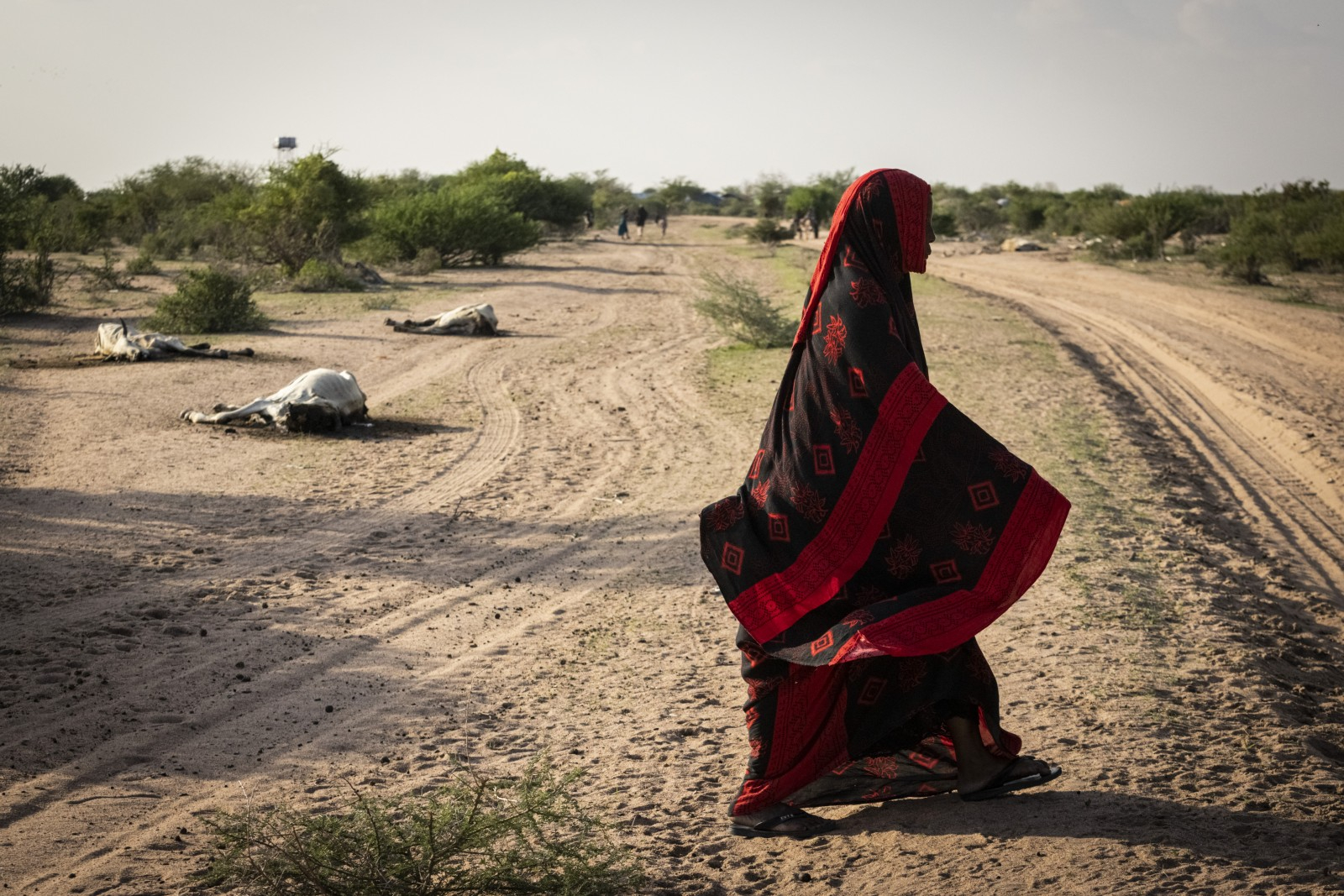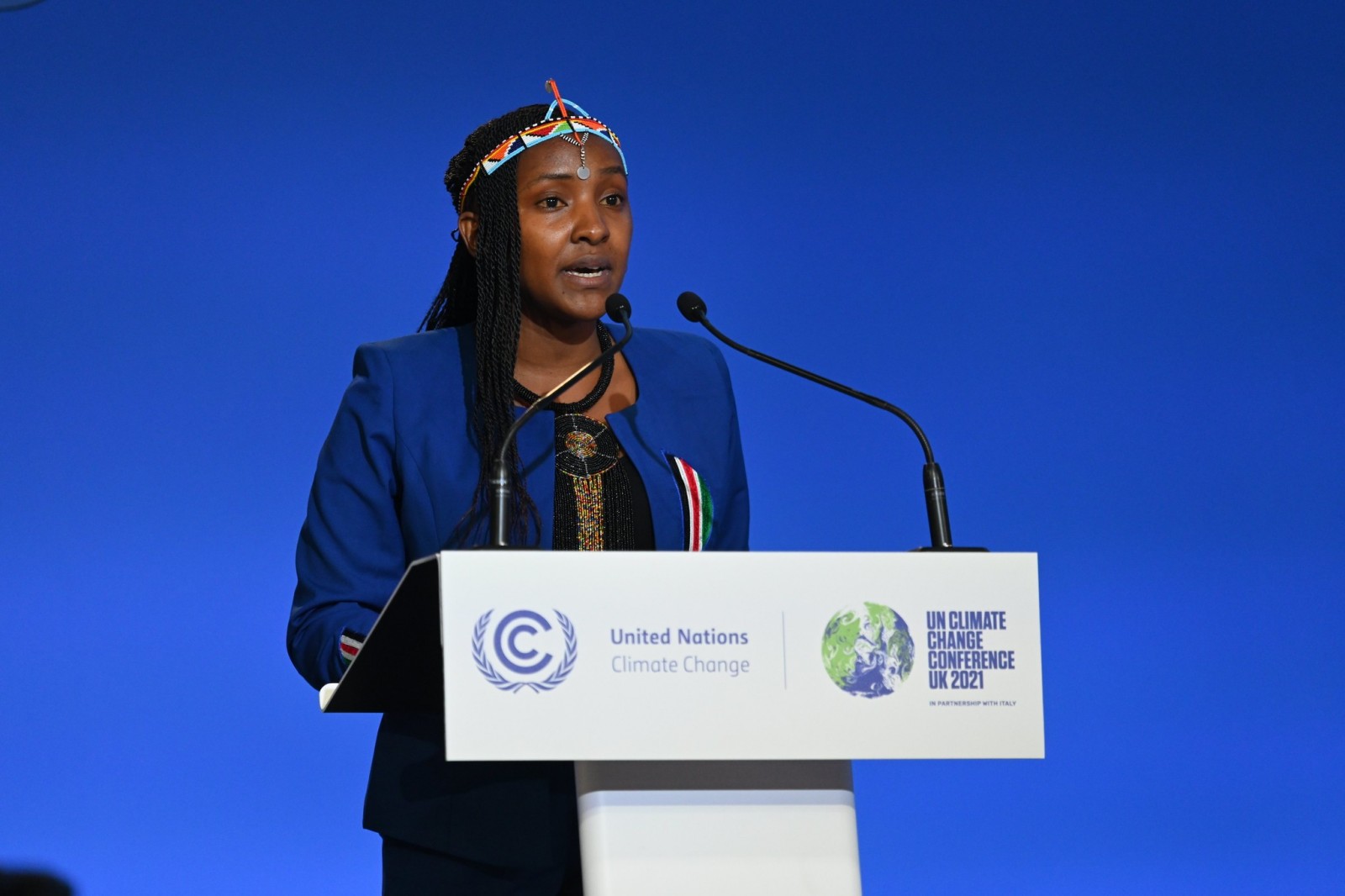Share post now
Article
The damage is already there, but not the finance
29.09.2023, Climate justice
The fuss over who should pay for the loss and damage caused by global warming is now decades old. This year, for the first time, the UN Climate Conference in Dubai will be negotiating payment modalities. Results are urgently needed.

A national disaster: The drought in Kenya keeps drying up life.
© Ed Ram/Getty Images
"In my country Kenya, we have had six failed rainy seasons, which has led to crop failures, prolonged drought and food insecurity. This has dramatically increased the cost for our farmers." These were the words of Elizabeth Wathuti, spoken loudly into a microphone on 22 June 2023 at the Champs de Mars in Paris in order to be heard by the thousands of people gathered there. Against the backdrop of the Eiffel Tower, the young activist talked about the impacts of the climate crisis and joined other speakers in calling for climate justice. At the same time, French President Emmanuel Macron was receiving guests from all over the world for a banquet at the Palais nearby. Hosted by Macron, and in the framework of an international summit, they had already spent the entire day discussing challenges and ways of scaling up funding for sustainable development in the Global South. The upshot was that their discussions would continue at the next conference.
International climate finance – to reduce greenhouse gas emissions and pay for climate adaptation in the Global South – has for years been bound up with the international legal obligation on the part of industrialised countries to contribute towards the collective finance target of 100 billion dollars per year. However, for lack of political will in the countries that caused the climate crisis, this amount has never been reached.
At the UN Climate Conference of November 2022 (COP27) in Sharm el-Sheikh, the countries of the Global South were able, for the first time, to conduct negotiations on funding for the loss and damage caused by climate change, and this, thanks also to decades of support by civil society organisations the world over. Loss and damage has already been running into the billions for years now – with exact estimates being dependent on the definition used – and it is most severe in places where people have the least resources to prepare for and adapt to it. Furthermore, it is compounding the debt situation of countries that are already highly indebted. The Federal Office for the Environment (FOEN) distinguishes between loss or damage resulting from gradual events (e. g., sea level rise) and from rapid events (e. g., storms and floods). Furthermore, alongside financially quantifiable loss and damage, there is also that which cannot be quantified, such as damage to cultural goods or ecosystems.
At this year's COP28 conference in Dubai, the financing of loss and damage will be one of the main topics of negotiation. This is so because one year ago, the contracting parties set themselves the task of adopting, in 2023, detailed provisions on finance for loss and damage. The discussion is limited to countries that are especially vulnerable to the impacts of the climate crisis. A UN fund is to be constituted, into which polluter countries will pay. Innovative global sources of finance are under discussion in that connection, potentially also involving contributions from private players, based on the polluter-pays principle. "Should such suggestions become reality, even high-emission companies around the world could contribute to this funding", writes Robin Poëll, FAON spokesperson, responding to a question from Alliance Sud. For the time being, however, any such global contribution towards the UN fund is likely to be insubstantial. Meanwhile, Switzerland could take the lead and look into introducing such a contribution, at least by companies in Switzerland that are harming the climate, as a way of raising funds to pay for loss and damage in the Global South.
Loss of trust complicates negotiations
The real bone of contention at the climate conference, however, could well be the question of which countries should pay into the fund and which ones should benefit from it. For this latter category, countries deemed especially vulnerable must be defined, or determined through negotiation. For the even more political question of who should contribute as polluting countries, the historic responsibility for the climate crisis, which can be clearly ascribed to the industrialised countries, comes up against today's country-by-country comparison of greenhouse gas emissions. In it, the biggest emerging countries account for an elevated share. The countries thus far contributing to the climate funding goals were determined in 1992. Switzerland would now like to see more countries being required to pay into the fund. To cite FOEN spokesperson Poëll: "Switzerland would like to see the responsibility being shared by countries contributing the most to climate change and having the capacity to do so. In reality, this would mean that rich emerging countries with high greenhouse gas emissions as well as private players would also make their contribution." So far, however, Switzerland and other donor countries in the North have failed in this respect, owing to resistance from the Global South. The fact is that industrialised countries have so far reneged on their funding promises and are therefore not credible when it comes to climate justice. Switzerland, for example, has calculated its "appropriate share" in climate funding not on the basis of its cumulative climate footprint, but based only on domestic emissions, which are much lower. Its failure to meet its climate target of cutting emissions by 20 per cent by 2020 should also be mentioned. Ultimately, the lack of trust between North and South also complicates negotiations on ambitious climate goals and the move away from fossil fuels. But if the countries of the Global South are to avoid manoeuvring themselves into global marginalisation, they must be able to secure their funding for renewable energy sources.
A compromise proposal for the structure of the new fund has been available since early November. What is striking is that the fund has been placed under the auspices of the World Bank, which is not known either for its pioneering role in the climate crisis or for a fair distribution of power. Naturally, this has led to strong criticism from countries in the Global South and civil society organisations. Besides the clear expectation that industrialised countries will contribute to the financing, other countries are also "encouraged" to participate in the financing. The question of which countries are considered to be most vulnerable and therefore eligible to benefit from the fund is likely to be left open at the conference, and will be up to the board of the new fund to decide. The board will consist of 26 members from all regions of the world (14 from developing countries), who will be able to take decisions by a four-fifths majority. At worst, this could lead to a stalemate in the implementation of the fund.
Time is short, loss and damage is already a reality, and is growing steadily worse. According to the World Climate Report, another factor at work here is the constantly widening gap in the funding available for climate change adaptation. People will not be able to adapt to every change. In the run-up to the 2021 UN Conference in Glasgow, the Foreign Minister of the Pacific island nation of Tuvalu created a lasting impression by delivering a speech with his trouser legs unceremoniously rolled up, standing at a lectern placed in the sea. This was done in order to highlight the issue of sea level rise. In Glasgow, Elizabeth Wathuti told the assembled world audience at the opening of the climate conference: "By 2025, half of the world's population will face water scarcity. And by the time I'm fifty, the climate crisis will have displaced 86 million people in Sub-Saharan Africa alone." No conference can end the climate crisis overnight. But financially covering damage and losses that have already occurred is urgently needed.

© Karwai Tang
Elizabeth Wathuti is a young Kenyan climate protection activist. She founded the Green Generation Initiative and became internationally known with her call for more solidarity at the UN Climate Change Conference in Glasgow 2021.
